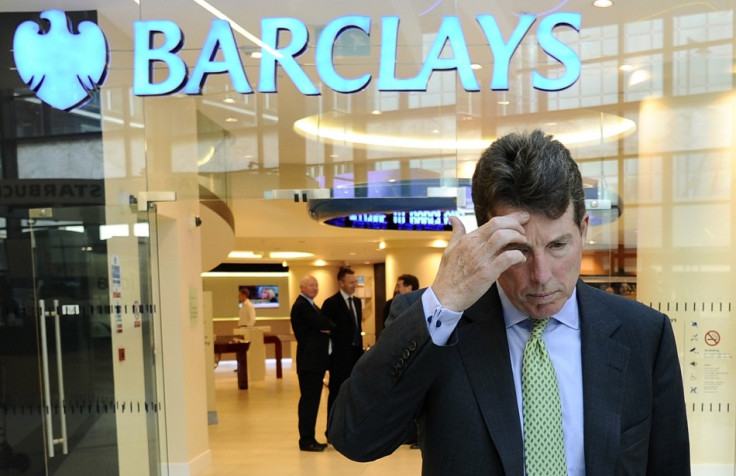Stefan Stern: Calm down Barclays, 'boring banking' is the way to financial success
As consolation prizes go, £28m is not at all bad. That is how much Antony Jenkins, the former chief executive of Barclays, stands to accumulate over the next six years if deferred shares received under a long-term incentive plan, along with his 12-month notice period payment, £950,000 allowance and £363,000 pension payment, a potential £1m bonus, and his existing 5.5 million shares (worth around £15m, received as performance pay over the past nine years) are all totted up together (calculations courtesy of the Financial Times).
There are quite a few "ifs" and variables needed to get you to that £28m figure. But still. It sounds like some sort of compensation for the brusque dismissal Jenkins suffered last week, apparently with little warning.

It is ironic that a large part of this eventual future payment depends on something called a "long-term incentive plan". Because long-termism does not seem to have been the motivation behind the board's decision to ask – no, tell – Jenkins to go.
It is worth recalling the circumstances in which Jenkins took on the top job at the bank. Barclays' reputation was in the mud. Its chairman and chief executive had resigned.
The former CEO, Bob Diamond, had become a symbol of a financial services sector that was out of control. The Libor pricing scandal confirmed what many had feared about the prevailing ethos in parts of the City. And Diamond, famously, had been the boss who had felt that, in his industry, the time for remorse was over.
Jenkins did more than simply steady the turquoise ship. He started the long process of changing both the bank's structure and culture. Barclays' chairman and now acting chief executive, John McFarlane, went so far as to congratulate Jenkins for the work he had done until now.
The share price on his departure was over 50% higher than it was when Jenkins took over. It was just that, you know, he wasn't the right leader to carry on the good work. It was time for someone else – for now, McFarlane himself – to speed up the process of restructuring, job cutting, and supporting the potentially highly profitable investment bank division. Culture change would continue, McFarlane asserted, but now without "Saint Antony" at the helm.
Shareholders may vote through long-term incentive plans. But there does not seem to be much incentive for CEOs to think very long term. Three years and you're out – that, at least, was Jenkins's experience, even though he was seen as having done a good job.
Employees can't catch average salary of FTSE 100 chiefs
On the contrary, the race is on to engineer a sharp rise in the share price to try and get so-called long-term incentive plans to pay out... over the short-to-medium term. The pay ratchet continues to turn. We are now in a situation where, as David Cameron's former speech writer Clare Foges was moved to observe, the average FTSE 100 CEO is getting paid about 130 times what the average employee in his or her business is getting.
"This is less market forces than a market stitch-up," Foges wrote in The Times. "A relatively small group of extremely highly paid directors sit on their peers' remuneration committees and approve their pay packages. This mutual back scratching is destined, like some Escher artwork, to carry on without end."
Must this race carry on in this way? What's the hurry? (And Barclays clearly is in a hurry: deputy chairman Sir Mike Rake is also leaving the company.) Companies should be thinking about their performance over the longer term. And an institution like a bank: why should that be the source of rapid and "superior" returns? Jenkins's instincts, to get back to "boring banking", look pretty sound to me. But some shareholders, and some board members, thought otherwise, it seems.

Jeff Immelt, CEO at the US engineering giant GE since 2001, is a role model long-termist leader. Jack Welch, his predecessor, was a tough (and noisy) act to follow. But Immelt has stayed the course and led a transformation of the business, now heading out of financial services and more fully into high value-added businesses.
Two years ago, he gave an interview to the Wharton business school in which he explained why slowness – and constancy – matter. On a holiday, he had climbed to the top of Mount Kilimanjaro with his daughter and was beginning the descent. But he went off too fast and kept falling.
"The guides have this expression in Swahili: 'puli, puli', which means, 'slowly, slowly'," Immelt explained. "If you want to change, if you want to drive stuff that's meaningful in life, it takes persistence."
He continued: "I see all these books for new CEOs about what to do in the first 100 days on the job. It's nonsense. As a CEO, you are running a marathon. Don't let the organisation backslide. Set new goals. Every day has to be better than the day before.
"This notion of 'puli, puli' has to do with resilience, persistence and sticking with your vision and your goals... Essentially, anything you want to do that is meaningful in life must be done over time. If you want to change big institutions, you've got to have incredible persistence and constancy of purpose." Immelt knows what the Barclays board does not.
Stefan Stern is a business, management and politics writer. He writes for The Guardian and The Financial Times and is a visiting professor at Cass Business School.
© Copyright IBTimes 2025. All rights reserved.






















